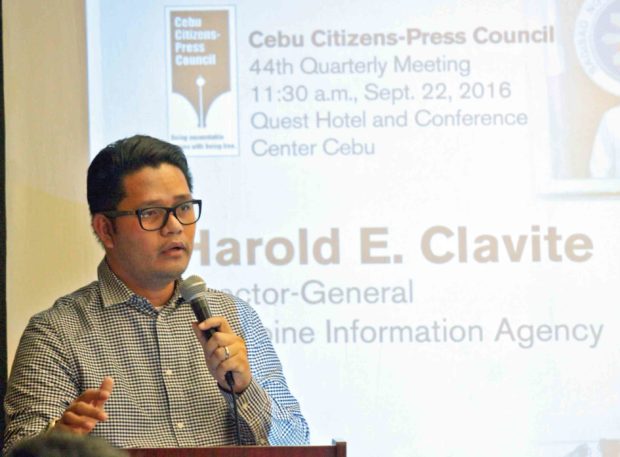Misuse of digital media dividing nation, says gov’t info exec

Irresponsible
social media users have been known to spread lies . . .
Harold Clavite
Director General,
Philippine Information Agency
BAGUIO CITY — The country’s literacy programs aren’t just about reading and writing anymore.
Educators and literacy coordinating councils (LCCs) now include programs that teach people how to discern information online because digital platforms have become the battleground between truth and manufactured data, according to officials who spoke at this year’s National Literacy Conference held here last week.
They said Filipinos had high levels of basic and functional literacy, with rates of 97 percent for females and 96.1 percent for males.
‘Yellowtard,’ ‘Dutertard’
But they do not have the same level of digital literacy despite the big number of people who use the internet, said Harold Clavite, director general of the Philippine Information Agency.
Article continues after this advertisementHe also said the misuse of digital media had created divisions instead of unity in the country.
Article continues after this advertisement“This is very clear. If you do not agree with certain issues, you are labeled as a ‘Yellowtard’ or ‘Dutertard,’ as if your views define your personality … That is very unfortunate and I think that has to really change,” he said.
Social media fluency
“Over and above reading and writing, we also now have to consider digital technology and fluency in social media … as aspects of literacy, otherwise our citizens and our children … would never be able to cope with the present and the future,” said Lorna Dino, chair of the National LCC and undersecretary for curriculum and instruction of the Department of Education.
Clavite said digital media had been a very good information tool but educators needed to impart the skill of separating personal biases because many people online were drawn to opinions and views similar to their own.
“Irresponsible social media users have been known to spread lies to forward their own agenda—be it personal or political,” he said. “But deliberately misinforming people might actually prompt them to make wrong decisions during critical situations.”
This was why it should be a rudimentary practice for social media users to fact-check whatever they read or discuss online, he said.
Beyond headline
“Read beyond the headline, read the whole article first because the headline is not the whole story,” Clavite said, adding that fake news “is spread not just through trolls or fake accounts but because they are able to take advantage of the gullible.”
“The surefire way to combat fake news is by becoming a responsible sharer of information. It should be a personal resolve,” he said. —Kimberlie Quitasol